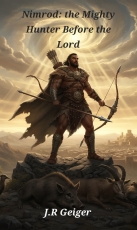
Book by: J.R. Geiger
Genre: Non-Fiction
"Cush fathered Nimrod; he was the first on earth to be a mighty man. He was a mighty hunter before the LORD."--- Genesis 10:8-9
The Bible isn’t shy about naming kings who fall. Pharaoh hardened his heart. Saul disobeyed. David, beloved of God, sinned and was rebuked in full view of history. When monarchs stumble and/or blessed, Scripture plainly speaks their names, their failings etched into the record as warnings for generations.
But Nimrod is different.
The text calls him “a mighty hunter before the Lord.” It names him as the founder of Babel, Erech, and Nineveh—the first king whose kingdom stretched across the plains of Shinar. And then, the narrative stops. No curse. No blessing. No verdict. Only the bare facts: hunter, king, builder. Period.
Later traditions, NOT Scripture, paint him as a rebel, a tyrant, the architect of Babel’s tower. Yet Genesis itself never says so. His name is absent from the story of the tower, absent from any charge of rebellion, absent from any fall from grace. This silence is striking. If Nimrod had defied God, wouldn’t the text have said so? If he had been blessed, wouldn’t the text have declared it?
This book is the fruit of my own research and reflection. I don’t claim to speak with final authority, only to follow the evidence where it leads. That evidence suggests something overlooked: Nimrod was not the rebel of Babel, but the hunter-king who could not restrain his people when they turned to pride. I believe he saw their ambition to build a tower to heaven as blasphemy against God. Unable to stop them, he left them to their own ends.
This is the Nimrod that I explore: the mighty one before the Lord, whose silence in Scripture isn’t condemnation, but mystery.
© Copyright 2026 J.R. Geiger. All rights reserved.
Regular reviews are a general comments about the work read. Provide comments on plot, character development, description, etc.
In-line reviews allow you to provide in-context comments to what you have read. You can comment on grammar, word usage, plot, characters, etc.
Hi friend That is a very compelling and well-articulated premise for a book exploring the figure of Nimrod!
Well done stuart
This looks interesting. I am not religious in any way so I tend to shy away from anything that has religious undertones. However, you are such a good writer I am willing to give this a go. I suspect you will focus more on the man/legend than any religious references.
I do hope you enjoy it. It's a short book. An introduction, 9 short chapters, and an Epilogue.
I don't get "preachy" either.
You are correct. I use quote scripture a little bit, but everything else is pure speculation because the evidence in Scripture AND history simply isn't there to condemn Nimrod like scholars have.
On the same hand, there's no evidence he was blessed by God either. BUT, I'm in the camp he was blessed. He was THE FIRST mighty man to be born after the great flood, became a great hunter, then a city builder and king.
Congratulations on a compelling introduction to a truly novel and interesting subject. When I was in school, my Senior AP English teacher would often address us as his "collection of Nimrods..." From Sunday school I was familiar with the basic story (and yes, we were told Nimrod built the tower of Babel) but I could never quite make the connection. i look forward to reading further to see if what you write gives me insight into what he meant. your opening is clean and well written, excellent work!
chappy1